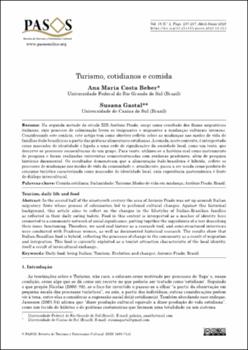Turismo, cotidianos e comida
Fecha
2020Resumen
Na segunda metade do século XIX Antônio Prado, surge como resultado dos fluxos migratórios
italianos, cujo processo de colonização levou os imigrantes e migrantes a mudanças culturais intensas.
Considerando este cenário, este artigo tem como objetivo refletir sobre as mudanças nos modos de vida de
famílias ítalo‑brasileiras a partir das práticas alimentares cotidianas. Acomida, neste contexto, é interpretada
como marcador de identidade e ligada a uma rede de significações da sociedade local, como um texto, que
descreve os processos socioculturais de um grupo. Para tanto, utilizou‑se a história oral como instrumento
de pesquisa e foram realizadas entrevistas semiestruturadas com senhoras pradenses, além de pesquisa
histórico documental. Os resultados demonstram que a alimentação ítalo‑brasileira é híbrida, reflete os
processos de mudanças nos modos de vida da comunidade e, atualmente, passa a ser usada como produto de
consumo turístico caracterizada como marcador de identidade local, cuja experiência gastronômica é fonte
de diálogo intercultural In the second half of the nineteenth century the area of Antonio Prado was set up aroundi Italian
migratory flows whose process of colonisation led to profound cultural changes. Against this historical
background, this article aims to reflect on the changes in the lifestyles of Italian‑Brazilian families
as reflected in their daily eating habits. Food in this context is interpreted as a marker of identity here
connected to a community network of social significance, putting together the ingredients of a text describing
their inner functioning. Therefore, we used oral history as a research tool, and semi‑structured interviews
were conducted with Pradense women, as well as documented historical research. The results show that
Italian‑Brazilian food is hybrid, reflecting the processes of change in the community as a result of migration
and integration. This food is currently exploited as a tourist attraction characteristic of the local identity,
itself a result of intercultural exchange..





